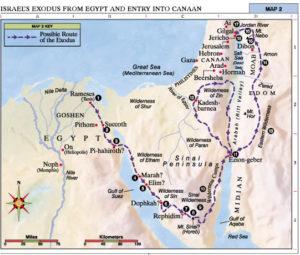Exodus 17:1-71NIV New International Version Translations
1 The whole Israelite community set out from the Desert of Sin, traveling from place to place as the Lord commanded. They camped at Rephidim, but there was no water for the people to drink. 2 So they quarreled with Moses and said, “Give us water to drink.” Moses replied, “Why do you quarrel with me? Why do you put the Lord to the test?” 3 But the people were thirsty for water there, and they grumbled against Moses. They said, “Why did you bring us up out of Egypt to make us and our children and livestock die of thirst?” 4 Then Moses cried out to the Lord, “What am I to do with these people? They are almost ready to stone me.” 5 The Lord answered Moses, “Go out in front of the people. Take with you some of the elders of Israel and take in your hand the staff with which you struck the Nile, and go. 6 I will stand there before you by the rock at Horeb. Strike the rock, and water will come out of it for the people to drink.” So Moses did this in the sight of the elders of Israel. 7 And he called the place Massah and Meribah because the Israelites quarreled and because they tested the Lord saying, “Is the Lord among us or not?”
 Background
Background
The wilderness of Sin Exodus 16:1 properly speaking ends here, the sandstone ceases, and is replaced by granite. It is thought that Rephidim was located at Feiran, the base of Mount Serbal, or at the pass of El Watiyeh. This part of the Exodus story emphasizes the general characteristic of the Israelites that the miracles, which always met each need as they arose, failed to produce a habit of faith in them. So as the the severity of this trial, their anguish of thirst in the burning desert, impacted their conduct.
The children of Israel journeyed according to the commandment of God, led by the pillar of cloud and fire, yet they came to a place where there was no water for them to drink. They began to question whether God was with them or not. This is called their “tempting God,” which signifies distrust of God after they had received past proofs of His power and goodness.
 The Arab tradition is that Moses was led to a rock located in Wady Feiran. Horeb was actually a name given to the whole desert of Sinai . It is questioned whether the water supply actually ceased or this story is documenting that the wants of the Israelites were always supplied by God and the Rock is a symbol for God who was always with them.
The Arab tradition is that Moses was led to a rock located in Wady Feiran. Horeb was actually a name given to the whole desert of Sinai . It is questioned whether the water supply actually ceased or this story is documenting that the wants of the Israelites were always supplied by God and the Rock is a symbol for God who was always with them.
We find that in spite of years of manna, provisions from God, the Israelites were “putting their God to the test,” something that both the Old and New Testament warns against. Matthew 4:7 Jesus said to him, “On the other hand, it is written, `YOU SHALL NOT PUT THE LORD YOUR GOD TO THE TEST.’ ” So this story by Moses in intended to show us that although we may meet with troubles, which Providence brings us into, those troubles are merely a trial of our faith, and that for God, the purposes are for His glorification and yes, for our relief too.
Items for Discussion
- What are the attributes of mankind that seem to let time erase the many examples of God’s interaction with our lives and let doubt and fear take the place of faithfulness?
- In what ways did God show His power and His pity?
- By the time the Israelites arrived at Rephidim, there was a new generation of people following Moses. What risks are there in not passing on our “faithfulness” to the next generation?
- As soon as there was a problem about water, the people accused Moses, saying that they wanted to kill him, his family and livestock. This was after all that Moses had done for them. What examples can you see that we have today showing the thanklessness of people to those that help them?
- Why is it important not to forget this story?
Acts 9:1-12
1 Meanwhile, Saul was still breathing out murderous threats against the Lord’s disciples. He went to the high priest 2 and asked him for letters to the synagogues in Damascus, so that if he found any there who belonged to the Way, whether men or women, he might take them as prisoners to Jerusalem. 3 As he neared Damascus on his journey, suddenly a light from heaven flashed around him. 4 He fell to the ground and heard a voice say to him, “Saul, Saul, why do you persecute me?” 5 “Who are you, Lord?” Saul asked. “I am Jesus, whom you are persecuting,” he replied. 6 “Now get up and go into the city, and you will be told what you must do.” 7 The men traveling with Saul stood there speechless; they heard the sound but did not see anyone. 8 Saul got up from the ground, but when he opened his eyes he could see nothing. So they led him by the hand into Damascus. 9 For three days he was blind, and did not eat or drink anything. 10 In Damascus there was a disciple named Ananias. The Lord called to him in a vision, “Ananias!” “Yes, Lord,” he answered. 11 The Lord told him, “Go to the house of Judas on Straight Street and ask for a man from Tarsus named Saul, for he is praying. 12 In a vision he has seen a man named Ananias come and place his hands on him to restore his sight.”
Background
This may be one of the most famous narratives in the New Testament, the conversion of Saul of Tarsus to Paul the Apostle. Saul was ill informed about his God. One of the more amazing parts of this story is that Saul (Paul) thought he ought to do all he could against the name of Christ, and actually thought he was doing God a good service by his behavior. This story should give us hope that there can be a renewing grace so strong that it can convert the greatest of sinners. Even more hope should come from the fact that Saul was pardoned by his God for the greatest of sins.
Once confronted by Christ, Saul submitted without reserve, wanting to know what the Lord Jesus would have him to do. Christ’s discoveries of Himself to poor souls are always humbling experiences. For three days Saul took no food, and it pleased God to leave him for that time without relief. His sins were now set in order before him; he was in the dark concerning his own spiritual state, and wounded in spirit for his sin. When a sinner is brought to a proper sense of his own state and conduct, the only course of action is to cast himself wholly on the mercy of the Saviour, asking what He would have Him to do.
Like Moses, God will direct the humbled sinner. The journey to believing is not always directly to joy and peace. Many will bear witness that without sorrows and distress of one’s conscience, we never really engage our souls to know Christ.
Items for Discussion
- Why did Paul think his actions were the right course to follow?
- How do people today make that same mistake?
- Why would God have temporarily blinded Paul and force him into isolation?
- What kinds of Damascus experiences do people still have today?
- How was Ananias an example of the way Christians should respond to someone going through a “Damascus Experience?”
Discussion Challenge
- We define Narrative as “a spoken or written account of connected events; a story. What are the stories that must be told regarding your encounters with Christ?
- Elements of a good personal narrative:
- What were things like before?
- Why did you think you were right?
- What happened to make you aware of Christ?
- How did you handle your “blind time?”
- Where did you go to learn more?
- Did you have an Ananias?
- What is your life like now and how is it different than before?
- Elements of a good personal narrative:
- 1NIV New International Version Translations
